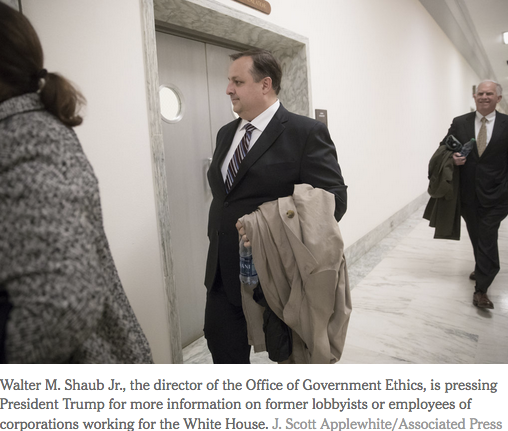Historically, the Office of Government Ethics — a tiny operation that has just 71 employees but that supervises an ethics program covering 2.7 million civilian executive branch workers — has maintained a low profile. Created in 1978 after the Watergate scandal, it does not have subpoena power or its own investigators.
But Mr. Shaub, in the last year of a five-year presidential appointment, is now pressing Mr. Trump for more information on former lobbyists or employees of corporations working in the president’s administration. The effort started before Inauguration Day to persuade Mr. Trump and his staff to comply with more conventional ethics standards used during the Obama and George W. Bush administrations.
The most recent request came late Friday, when Mr. Shaub asked every executive branch agency — including the White House — to give him, by June 1, a copy of any waivers issued to political employees allowing them to ignore any part of the executive branch’s ethics policies, saying in his letter that he was “advancing the mission of the executive branch ethics program.”
Such waivers are typically issued when the administration wants to allow a new political employee to work on an issue, like federal housing or environmental policy, that involves people the new employee may have worked with previously. For example, Ernest J. Moniz, the energy secretary in the Obama administration, was allowed to work on matters that involved General Electric, even though Mr. Moniz, as a nuclear physicist, had served on a General Electric advisory board. About 70 such waivers were issued during the Obama administration.
Clean Government? Prove It
On the campaign trail and in office, President Trump proclaimed his determination to keep his administration free of lobbyists, foreign agents and special interests, who have “reaped the rewards of government while the people have borne the cost,” as he said in his inaugural address.
A week later, Mr. Trump signed an executive order requiring executive branch employees to obey a list of rules designed to prevent conflicts of interest. But the order is rendered practically worthless by a clause allowing waivers to ethical rules for any White House staff, without any written explanation or public disclosure. That’s why the ethics office, which ensures that public servants enter government free from potential conflicts of interest, is demanding that the White House provide the names of executive branch officials who have received waivers, on what issues, by June 1.
Read full editorial




